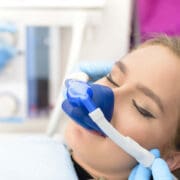What Is Sedation Dentistry? Benefits and What to Expect
What is sedation dentistry, and how can it enhance your dental experience? Sedation dentistry involves the use of medication to help patients relax during dental procedures, offering a more comfortable and stress-free experience. Understanding its benefits and what to expect can help alleviate common anxieties associated with dental visits.
What Is Sedation Dentistry?
What is sedation dentistry? At its core, sedation dentistry involves the use of medication to help patients relax during dental procedures. This approach is particularly beneficial for individuals who experience anxiety or fear when visiting the dentist. By using various levels of sedation, from minimal to deep, dental professionals can ensure that patients remain calm and comfortable throughout their treatment. Sedation dentistry can be applied to a wide range of procedures, from routine cleanings to more complex dental work.
Understanding what is sedation dentistry is essential for those who may feel apprehensive about dental visits. It provides an opportunity for patients to receive necessary dental care without the stress and discomfort that often accompanies such experiences. For more detailed information on the different types of sedation used in dentistry, you can explore our guide on What Is Oral Sedation? A Guide to Anxiety-Free Dentistry.
Types of Sedation Methods
Sedation dentistry encompasses a variety of methods designed to help patients feel more relaxed during dental procedures. The most common types include nitrous oxide, oral sedation, and intravenous (IV) sedation. Nitrous oxide, often referred to as “laughing gas,” is inhaled through a mask and helps patients feel calm while remaining conscious. Oral sedation involves taking a prescribed medication prior to the appointment, which induces a state of relaxation. IV sedation is administered directly into the bloodstream, allowing for a deeper level of sedation and is typically used for more complex procedures.
Each method of sedation is tailored to meet the specific needs and anxiety levels of the patient, ensuring a comfortable experience. The choice of sedation depends on various factors, including the patient’s medical history and the complexity of the dental procedure. For those interested in learning more about how these methods can be applied in practice, consider exploring Rancho Mirage Sedation Dentistry Services for further insights.
Who Needs Sedation Dentistry
Understanding what is sedation dentistry can help identify who might benefit from this approach to dental care. Sedation dentistry is often considered by individuals who experience significant anxiety or fear when visiting the dentist, making it challenging for them to undergo necessary dental procedures. It can also be beneficial for those with a low pain threshold, sensitive teeth, or a strong gag reflex. Additionally, patients requiring extensive dental work or those with special needs that make it difficult to sit still for extended periods may find sedation dentistry advantageous. By alleviating stress and discomfort, sedation dentistry can facilitate a more relaxed and manageable dental experience for these individuals.
Safety of Sedation Dentistry
When exploring what is sedation dentistry, understanding its safety is crucial for patients considering this option for their dental care. Sedation dentistry is generally considered safe when administered by a trained and experienced dental professional. Various levels of sedation, from minimal to deep, are tailored to meet individual patient needs, ensuring a comfortable and anxiety-free experience. The safety protocols in place are designed to monitor vital signs and maintain patient well-being throughout the procedure. For those interested in learning more about sedation dentistry, Cros Dental offers insights into this practice as a trusted Rancho Mirage Dentist.
Common Sedation Dentistry Procedures
When exploring what is sedation dentistry, it’s essential to understand the common procedures that often involve sedation. These procedures can range from routine cleanings for patients with dental anxiety to more complex treatments like root canals or tooth extractions. Sedation dentistry is designed to help patients feel relaxed and comfortable during their dental visits, ensuring that necessary treatments are completed efficiently and with minimal stress. Whether it’s through nitrous oxide, oral sedatives, or intravenous methods, sedation dentistry provides a tailored approach to meet the unique needs of each patient, making dental care more accessible and less daunting.
Preparing for Sedation Dentistry
Understanding what is sedation dentistry is crucial when preparing for a procedure that involves it. This type of dentistry involves the use of medication to help patients relax during dental treatments, making it essential to be well-prepared for the experience. Before undergoing sedation dentistry, patients typically have a consultation with their dentist to discuss their medical history and any concerns they might have. This ensures that the chosen sedation method is safe and effective for their specific needs. Additionally, patients are usually advised to arrange for transportation to and from the appointment, as the effects of sedation can linger after the procedure. Being informed about what is sedation dentistry and its preparation process can help alleviate anxiety and ensure a smoother dental experience.
During the Sedation Process
Understanding what is sedation dentistry involves knowing what to expect during the sedation process. Typically, patients are administered a sedative to help them relax and feel at ease throughout their dental procedure. The level of sedation can vary from minimal, where the patient is awake but relaxed, to deep sedation, where the patient is on the edge of consciousness but can still be awakened. Throughout the process, dental professionals closely monitor the patient’s vital signs to ensure safety and comfort. This approach aims to alleviate anxiety and make dental visits more manageable for those who experience fear or discomfort during dental treatments.
Recovery After Sedation Dentistry
Understanding what is sedation dentistry includes knowing what to expect during the recovery process. After undergoing sedation dentistry, patients typically experience a period of grogginess as the sedative effects gradually wear off. It’s common for individuals to feel drowsy and have limited memory of the procedure, which is a normal part of the recovery phase. The duration of recovery can vary depending on the type and level of sedation used, but most patients find that they return to their usual state within a few hours. It’s important to arrange for someone to accompany you home after the procedure, as driving or operating heavy machinery is not advisable until the sedative effects have completely dissipated.
Benefits of Sedation Dentistry
Understanding what is sedation dentistry can help alleviate the anxiety often associated with dental visits. One of the primary benefits of sedation dentistry is its ability to provide a relaxed and comfortable experience for patients who may have dental phobias or heightened sensitivity to pain. This approach can make lengthy or complex procedures more manageable, as patients are less likely to experience discomfort or stress. Additionally, sedation dentistry can reduce the gag reflex, making it easier for dentists to perform necessary treatments efficiently. Overall, sedation dentistry enhances the overall dental experience by promoting a sense of calm and ease during procedures.
Conclusion
Understanding what is sedation dentistry can ease your mind about dental visits; for more information, call 760-444-3202 or check out our Google Maps reviews.



